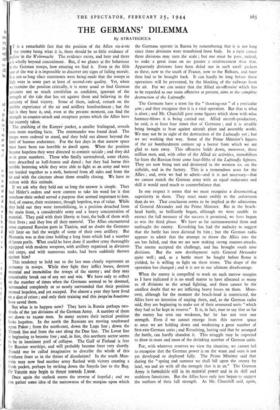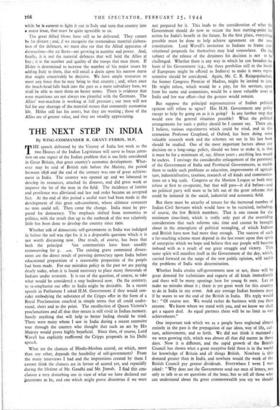THE GERMANS' DILEMMA
By STRATEGICUS
The crushing of the Kanyev pocket, a smaller Stalingrad, reveals even more startling facts. The commander was found dead. The troops were ordered to stand, and they held out almost beyond the limit of human endurance. For the last days in that narrow space must have been too horrible to dwell upon. When the position became hopeless they were directed to commit suicide ; and they did so in great numbers. Those who finally surrendered, some 18,000, were described as half-frozen and dazed ; but they had borne this terrible battering while they were able to fight as an army and were not herded together as a mob, battered from all sides and from the air and with the cincture about them steadily closing. We have to reckon with this attitude.
If we ask why they held out so long the answer is simple. They had Hitler's orders and were content to take his word for it that somehow their ordeal served a purpose that seemed important to him. And, of course, their resistance, though hopeless, was of value. While hey held out they were immobilising, in a position detached from o the main front, a considerable army and a heavy concentration of
material. They paid with their liberty at least, the bulk of them with
h their lives ; and they lost all their material. The Allies encountered it some captured Russian guns in Tunisia, and no doubt the Germans d will later on feel the weight of some of their own artillery. But
Manstein was at that time holding a long front which had a number
of latent perils. What could he have done if another army thoroughly equipped with modern weapons, with artillery organised in divisions and corps, and with numerous tanks, had been suddenly thrown against him?
This tendency to hold out to the last man clearly represents an economy in troops. While they fight they inflict losses, destroy material and immobilise the troops of the enemy ; and they may conceivably break out of any net and win. We have only to reflect on the number of times when the Germans seemed to be doomed, surrounded completely or so nearly surrounded that their position seemed hopeless, and yet escaped. For almost a year they have lived on a diet of crises ; and only their training and this jusqu'au boutisme have saved them.
But what is to happen now? They have in Russia perhaps two- thirds of the 30o divisions of the German Army. A number of them are down • to ropoo men. In many sectors their tactical position looks hopeless. In the north the Russians are moving southward upon Pskov ; from the north-east, down the Luga line ; down the Shimsk line and from the east along the Dno line. The Lovat line is beginning to become free ; and, in fine, this northern sector seems to be in imminent peril of collapse. The Gulf of Finland is free for Russian warships, and will probably become freer very shortly. Should one be called imaginative to describe the whole of this northern front as in the throes of dissolution? In the south Man- stein may now find another army flushed with victory creating a fresh pocket, perhaps by striking down the Smyela line to the Bug. Or Vatutin may begin to thrust towards Lwow.
Once again the outlook seems the reverse of hopeful ; and we can gather some idea of the narrowness of the margins upon which the Germans operate in Russia by remembering that it is not long since three divisions were transferred from Italy. In a tight corner three divisions may turn the scale ; but one must be poor, indeed, to stake a great issue on no greater a reinforcement than that. Apparently divisions have been doled out in such small packets as these, now to the south of France, now to the Balkans, and have then had to be brought back. It can hardly be long before these operations will be prevented, by the blocking of the railways from the air. For we can notice that the Allied air-offensive which has to be regarded as our main offensive at present, aims at the complete destruction of the Luftwaffe.
The Germans have a term for the " shooting-out " of a particular arm ; and they recognise that it is a vital operation. But that is what is afoot ; and Mr. Churchill gave some figures which show with what hammer-blows it is being carried out. Allied aircraft-production, he said, is at least four times that of Germany ; and it is steadily being brought to bear against aircraft plant and assembly works. We may not be in sight of the destruction of the Luftwaffe yet ; but we are working that way. Some of the Prime Minister's figures of the air bombardment conjure up a horror from which we are glad to turn away. This offensive holds down, moreover, three million men, and, with other of the Allied air activities, immobilises far from the Russian front some four-fifths of the Luftwaffe fightets. They are now being met and destroyed in the western air, on the airfields, and in the factory. This is a tremendous asset for the Allies ; and, even we had to admit—and it is not necessary—that we cannot match the German army with an equal endurance and skill it would need much to counterbalance that.
In one respect it seems that we must recognise a disconcerti.tg superiority in them. They react more swiftly to the unforeseen than do we. That conclusion seems to be implied in the admissions of General Alexander and the Prime Minister. But in the beach- head battle, so brilliantly begun, although we were unable to extract the full measure of the success it promised, we have begun to win the third phase. We have so far outmanoeuvred them and outfought the enemy. Kesselring has had the audacity to suggest that the battle has been dictated by him ; but the German radio appears to admit that the attempt to throw the Allies into the sea has failed, and that we are now making strong counter-attacks. The enemy accepted the challenge, and has brought south nine divisions. But the new development suits General Alexander quite well ; and, as a battle must be fought before Rome is yielded, he is willing to fight on these terms. The shape of the operation has changed ; and it is not to our ultimate disadvantage.
When the enemy is compelled to work on such narrow margins as I have indicated it is no small matter to have allocated as many as 18 divisions to the actual fighting, and there cannot be the smallest doubt that we are inflicting heavy losses on them. More- over, although for the moment the beach-head is constricted, the Allies have no intention of staying there, and, as the German radio said, they are beginning to make use of their armoured units " which they had so far kept in reserve." It is, in fact, true to say that so far the enemy has seen our weakness, but he has not seen our strength. Even if we cannot emerge from this narrow space at once we are holding down and weakening a great number of first-rate German units ; and Kessclring, having said that he arranged the battle, can hardly abandon it. This struggle may be expected to draw in more and more of the shrinking number of German units.
For, with whatever reserves we view the situation, we cannot fail to recognise that the German power is on the wane and ours is not yet developed or deployed fully. The Prime Minister said that during the " spring and summer we shall fall upon the enemy by land, sea and air with all the strength that is in us." The German Army is formidable still in its material power and in its skill and stubborn fanaticism. But the Allies have only just begun to suggest the outlines of their full strength. As Mr. Churchill said, again,
while he is content to fight it out in Italy and turn that country into a major issue, that must be quite agreeable to us.
The great Allied blows have still to be delivered. They cannot be far distant ; and, if we recognise the tremendous material elabora- tion of the defences, we must also see that the Allied apparatus of destruction—the air fleets—are growing in number and power. And, finally, it is not the material defences that will hold the Allies at bay ; it is the number and quality of the troops that man them. If Hitler is determined to increase the number of his major issues by adding Italy to them, that will entail a drain upon his narrow purse that might conceivably be decisive. We have ample resources to meet any force that he may bring to that country ; and, when once the beach-head falls back into the past as a mere subsidiary base, we shall be able to meet them on better terms. There is evidence that even munitions are not always too plentiful with the Germans. The Allies' war-machine is working at full pressure ; our men will not fail for any shortage of the material means that commonly economise life. Hitler still has his asset3, but they are wasting ; those of the Allies are of greater value, and they are steadily appreciating.



























 Previous page
Previous page